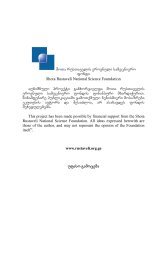- Page 1 and 2:
SoTa rusTavelis qarTuli literaturis
- Page 3 and 4:
sarCevi И.Л.БАГРАТИОН-М
- Page 5 and 6:
KETEVAN ELASHVILI Artistic Range of
- Page 7 and 8:
TATIANA MEGRELISHVILI Georgia, Tbil
- Page 9 and 10:
О.П. НОВИК Украина,
- Page 11 and 12:
merab RaRaniZe saqarTvelo, Tbilisi
- Page 13 and 14:
И.Л.БАГРАТИОН-МУХРА
- Page 15 and 16:
ние и тот факт, что
- Page 17 and 18:
ных афонских тради
- Page 19 and 20:
Попробуем ответить
- Page 21 and 22:
Ученику Гумилева в
- Page 23 and 24:
окостенения, безде
- Page 25 and 26:
Л.Х. БАЛАГОВА-КАНДУ
- Page 27 and 28:
«пшеницу» - как «вн
- Page 29 and 30:
К’ат вводит в свою
- Page 31 and 32:
«Безысходность» и
- Page 33 and 34:
Адыгская диаспора -
- Page 35 and 36:
И.В.БАНАХ Беларусь,
- Page 37 and 38:
ность отношений ме
- Page 39 and 40:
А о Гоголе писать н
- Page 41 and 42:
Так и не стали стре
- Page 43 and 44:
писателей возводит
- Page 45 and 46:
Iryna Banakh Belarus, Grodno It’s
- Page 47 and 48:
mkvidrdeba qarTul poeziaSi unikalur
- Page 49 and 50:
qarTul poeziaSi himni, rogorc lirik
- Page 51 and 52:
asea p. klodelis himnebSi, nicSes `
- Page 53 and 54:
In order to differentiate the “hy
- Page 55 and 56:
konstantine bregaZe saqarTvelo, Tbi
- Page 57 and 58:
fr. Slaiermaxeris mixedviT teqstis
- Page 59 and 60:
uli teqstis pirvelsazrisis, anu mTe
- Page 61 and 62:
h e r m e n e v t i k a gasagebi ga
- Page 63 and 64:
inner logos of a text. On its part,
- Page 65 and 66:
ogorc miamiturad fiqrobs bevri Cven
- Page 67 and 68:
i-konstantine _ sxva), romelic am s
- Page 69 and 70:
* * * arqetipi, romelic anTroponimT
- Page 71 and 72:
Levan Bregadze Georgia, Tbilisi Pol
- Page 73 and 74:
mainc ra aris iseTi, ris gamoc dRem
- Page 75 and 76:
aqcenti gadatanilia 1801 wlis 12 se
- Page 77 and 78:
aRgviareben qarTvelebs saqveynod Ta
- Page 79 and 80:
1914 wels, rogorc cnobilia, akakim
- Page 81 and 82:
to Russo-Japanese war and later. In
- Page 83 and 84:
mijnavs erTmaneTisgan zRaparsa da i
- Page 85 and 86:
miTosur msoflgagebas ireklaven da m
- Page 87 and 88:
`qristianizacia ar niSnavs marto Rv
- Page 89 and 90:
sixaruliZe 2001: sixaruliZe q. amir
- Page 91 and 92:
nana gonjilaSvili saqarTvelo, Tbili
- Page 93 and 94:
avTandilma daamarcxa mekobreni _ `a
- Page 95 and 96:
`vefxistyaosanSi~ `tyve~ orgvari Si
- Page 97 and 98:
`Cemsa tyvesa ver gavswirav, Tqvenc
- Page 99 and 100:
mfrinvelTa, gina nadirTa, eg saxed
- Page 101 and 102:
am mimarTebiT kidev uamravi magaliT
- Page 103 and 104:
xos ucxo~ rom `Seuyvardeba~ da `gul
- Page 105 and 106:
`mona~-`monebisa~ da `tyve~-`tyveob
- Page 107 and 108:
nislTametyvelebis sawyisi, raRa Tqm
- Page 109 and 110:
miZinebuli nisli am poemaSi qalwule
- Page 111 and 112:
Ketevan Elashvili Georgia, Tbilisi
- Page 113 and 114:
• is aris mwvane (Teimuraz batoni
- Page 115 and 116:
sac micvalebulebs pirSi uwyobdnen m
- Page 117 and 118:
da rom mTeli romani Tavisi wyaroebi
- Page 119 and 120:
1. tarielis avTandilisadmi monaTxro
- Page 121 and 122:
qamris kvanZebis jadosnur TvisebebS
- Page 123 and 124:
If we look over the translations of
- Page 125 and 126:
Таким образом, след
- Page 127 and 128:
В третьем прологе,
- Page 129 and 130:
гия того, что, остав
- Page 131 and 132:
Пастернака: «К моля
- Page 133 and 134:
Galina Vasileva Russia, Novosibirsk
- Page 135 and 136:
vel faqtebTan da movlenebTan. ∗ T
- Page 137 and 138:
Si dadgenili Rirebulebebis Seswavla
- Page 139 and 140:
andaza: [hažž ’abel mā júhfer
- Page 141 and 142:
Khatuna Tumanishvili Georgia, Tbili
- Page 143 and 144:
тами и осознают сов
- Page 145 and 146:
метров: этнически м
- Page 147 and 148:
самостоятельными ф
- Page 149 and 150:
Еще более показате
- Page 151 and 152:
образов в языковой
- Page 153 and 154:
ных цветовых ассоц
- Page 155 and 156:
но эти понятия необ
- Page 157 and 158:
mariam karbelaSvili saqarTvelo, Tbi
- Page 159 and 160:
ivane javaxiSvilis formulirebis ter
- Page 161 and 162:
ze gadasvla — grandiozuli gadatri
- Page 163 and 164:
TvelologiaSi am mecnierebis dafuZne
- Page 165 and 166:
Mariam Karbelashvili Georgia, Tbili
- Page 167 and 168:
lebels xdis obieqtis marTebulad aRq
- Page 169 and 170:
Rabi), is martosuli da amayia, magr
- Page 171 and 172:
vi, Sen rom giyvarda, Seni mkerdida
- Page 173 and 174:
angria da yofiereba astralur sferoe
- Page 175 and 176:
damowmebani: buaCiZe 1993: buaCiZe
- Page 177 and 178:
aramiZes dauweria. masSi araerTi ar
- Page 179 and 180:
cavad, Cans, im periodSi warmarTuli
- Page 181 and 182:
mde, e. i. farnavazis mier sakulto
- Page 183 and 184:
lobT, ar vikvlevT, marTla iraneli S
- Page 185 and 186:
qarTuli mwerloba qristianobis Semos
- Page 187 and 188:
ana leTodiani saqarTvelo, Tbilisi T
- Page 189 and 190:
saqrTveloSi, _ aRniSnavs ivane java
- Page 191 and 192:
CamoxrCobiT da xel-fexis mokveTa. i
- Page 193 and 194:
aseve aqcentirebulia is, rom Tamari
- Page 195 and 196:
Й. Д. ЛЮЦКАНОВ Болга
- Page 197 and 198:
трагизм человеческ
- Page 199 and 200:
общественную и кул
- Page 201 and 202:
ным. Положительный
- Page 203 and 204:
“С Вячеслава Ивано
- Page 205 and 206:
ТАТЬЯНА МЕГРЕЛИШВИ
- Page 207 and 208:
щей до саморазруше
- Page 209 and 210:
представлением о с
- Page 211 and 212:
чия «идеал-действи
- Page 213 and 214:
В таком прочтении С
- Page 215 and 216:
всех устоев столь н
- Page 217 and 218:
жит первое столкно
- Page 219 and 220:
своеобразное предв
- Page 221 and 222:
«небытия» личности
- Page 223 and 224:
TATIANA MEGRELISHVILI Georgia, Tbil
- Page 225 and 226:
mTargmneli: Txzulebis avtori, Tu _
- Page 227 and 228:
ogorc sruli Targmanebi, ise calkeul
- Page 229 and 230:
sakiTxis kvlevis mocemul etapze saW
- Page 231 and 232:
ovnuls Soris, aseTi bolomde ganvlil
- Page 233 and 234:
izmiT, reminiscenciebiT, Sinagani m
- Page 235 and 236:
qciebi aqvs SeTavsebuli. salTujTan
- Page 237 and 238:
damarcxda. damarcxebasTan erTad eWv
- Page 239 and 240:
Inga Milorava Georgia, Tbilisi The
- Page 241 and 242:
Все, абсолютно все,
- Page 243 and 244:
кальность этого яв
- Page 245 and 246:
Однако, еще более я
- Page 247 and 248:
пытается понять и д
- Page 249 and 250:
рассказа «Шаушпиле
- Page 251 and 252:
Степанов 2001: Степан
- Page 253 and 254:
weris amgvari manera originaluria,
- Page 255 and 256:
parashmh,nasqai kai. ei,pei/n w`j e
- Page 257 and 258:
ave,ra kai. oiv a;qeoi kai. dussebe
- Page 259 and 260:
sofio mujiri saqarTvelo, Tbilisi in
- Page 261 and 262:
Todoqs mowinaaRmdeges. ∗ „dasav
- Page 263 and 264:
gamudmebiT exmareba Tavis alevitel
- Page 265 and 266:
Sirdeba. alevitebis siyvaruli RmerT
- Page 267 and 268:
ebiviT ukavSirdebian da damwerlobis
- Page 269 and 270:
The young characters of the intercu
- Page 271 and 272:
ogorc aRniSnaven, bizantiis istoria
- Page 273 and 274:
erZnebis nacionalur TviTSegnebas, r
- Page 275 and 276:
SemoWris Semdeg did eklesias TavSef
- Page 277 and 278:
amrigad, bizantiis aRsasrulis xanis
- Page 279 and 280:
maia naWyebia saqarTvelo, Tbilisi s
- Page 281 and 282:
istoriuli qronikis tipis dramatul n
- Page 283 and 284:
ukve miuTiTebs imaze, rom nawarmoeb
- Page 285 and 286:
skalicelma iezuitmac. magram faqti
- Page 287 and 288:
maia niniZe saqarTvelo, Tbilisi int
- Page 289 and 290:
vi verasodes gamoiRebs nayofs venax
- Page 291 and 292:
uli sagalobeli: `Sen xar venaxi, ax
- Page 293 and 294:
ganvixiloT am TvalsazrisiT xuTi qis
- Page 295 and 296:
om saxarebiseuli mevenaxeobis inter
- Page 297 and 298:
qeTi niniZe saqarTvelo, Tbilisi ram
- Page 299 and 300:
aristokratiuli klasis eTosi vrcelde
- Page 301 and 302:
literaturaSi. giorgi erisTavis adre
- Page 303 and 304:
teritoriebze gavrcelebul imperiul i
- Page 305 and 306:
О.П. НОВИК Украина,
- Page 307 and 308:
что требуют тщател
- Page 309 and 310:
В барочную эпоху по
- Page 311 and 312:
нецкого и других, в
- Page 313 and 314:
of important features of baroque ae
- Page 315 and 316:
iq Calagebul atlantikis anTebul gem
- Page 317 and 318:
ase daiwyo svla poeziis citadeliske
- Page 319 and 320:
saerTod, paolo iaSvilis am periodis
- Page 321 and 322:
1934 weli _ „rogorc zecidan mtred
- Page 323 and 324:
aTomis caze me vumzer yvavebs. brZa
- Page 325 and 326:
mTlianad simbolisturi moZraobis pas
- Page 327 and 328:
nino popiaSvili saqarTvelo, Tbilisi
- Page 329 and 330:
xis Semaqcevari. sityvis Tavze `Cem
- Page 331 and 332:
to neologisms underlines their spec
- Page 333 and 334:
sxvadasxva safexurze aris sxvadasxv
- Page 335 and 336:
da migvaCnia, rom renesansis epoqis
- Page 337 and 338:
mimdinare globalizaciis konteqstSi
- Page 339 and 340:
emigranti mwerlis identobis upirvel
- Page 341 and 342:
Irma Ratiani Georgia, Tbilisi Metho
- Page 343 and 344:
ase ubadrukad iyo Semosili; amitoma
- Page 345 and 346:
ataka, Tumc odisevsi ar SeuSinda, w
- Page 347 and 348:
sokrate eyrdnoba im gamonaTqvams, r
- Page 349 and 350:
Nestan Ratiani Georgia, Tbilisi The
- Page 351 and 352:
gadmocemebis mixedviT, bavSvebs ita
- Page 353 and 354:
ogorc vxedavT, am gadmocemis mixedv
- Page 355 and 356:
ul iseT saxeebs, rogorebic arian ga
- Page 357 and 358:
ХХ веку предшество
- Page 359 and 360:
невежества и пробл
- Page 361 and 362:
ЛИТЕРАТУРА: Гейбул
- Page 363 and 364:
ного постижения ма
- Page 365 and 366:
Феминистические ис
- Page 367 and 368:
резентирующихся в
- Page 369 and 370:
ные отрицают, что ч
- Page 371 and 372:
Huyssen 1984: Huyssen, Andreas. Mas
- Page 373 and 374:
исследователи расс
- Page 375 and 376:
жен уметь хорошо оц
- Page 377 and 378:
Anna Fromm Russia, Nizhny Novgorod
- Page 379 and 380:
(Ives Reuter). am ukanasknels ganma
- Page 381 and 382:
wilSi homodiegeturi mTxrobeli figur
- Page 383 and 384:
ne ucvleli rCeba. metalefsisisgan g
- Page 385 and 386:
Teimuraz qurdovaniZe saqarTvelo, Tb
- Page 387 and 388:
sayofiero zRapris umTavresi maxasia
- Page 389 and 390:
lebriv, es Sexedulebebi Seusabamoba
- Page 391 and 392:
893), Wkuis saswavlebeli zRapari-ig
- Page 393 and 394:
merab RaRaniZe saqarTvelo, Tbilisi
- Page 395 and 396:
ise sazogadoebis mxriv. magram piro
- Page 397 and 398:
lobaSi aTenSi, rogorc cnobilia, kul
- Page 399 and 400:
zog SemTxvevaSi uaryofilia TviT poe
- Page 401 and 402:
aramed misi gamWriaxobisa da mixved
- Page 403 and 404:
saZlebelia, rom es miTosi ramdenime
- Page 405 and 406:
debuleba ideologiuri koniunqturis,
- Page 407 and 408:
Sinagani individualur-fsiqologiuri
- Page 409 and 410:
giunter grasma Tavis erT-erT bolodr
- Page 411 and 412:
sebobs opozicionerTa cixeSi Cayris
- Page 413 and 414:
Ю.А. ШАНИНА Россия,
- Page 415 and 416:
стрелы» (111) и вызыв
- Page 417 and 418:
лос» (101). Светлое на
- Page 419 and 420:
вающих в нем бурю э
- Page 421 and 422:
Подводя итог, на ос
- Page 423 and 424:
Julia Shanina Russia, Ufa Mythologi
- Page 425 and 426:
из рассказа «Вероч
- Page 427 and 428: дорожки; георгины и
- Page 429 and 430: треты архиереев, ви
- Page 431 and 432: - садово-парковый: «
- Page 433 and 434: жене молодого чело
- Page 435 and 436: узнаете ни дома, ни
- Page 437 and 438: вспоминая свою жиз
- Page 439 and 440: Цоффка 2001: Цоффка В.
- Page 441 and 442: sasuliero mwerlobis sxvadasxva darg
- Page 443 and 444: ove qarTuli literatura or did nakad
- Page 445 and 446: ac sazeimo, aRmatebul ganwyobas yva
- Page 447 and 448: stiliT, eniTa da leqsikiT Sesrulebu
- Page 449 and 450: Tematur-semantikuri da Janrobrivi r
- Page 451 and 452: an SemkrebelobiTi da tradiciuli kom
- Page 453 and 454: torebi yvelaze metad scodaven, Tumc
- Page 455 and 456: some authors are very exalted, but
- Page 457 and 458: lanZRvisa da cemis miTosur gaazreba
- Page 459 and 460: folklorSi iSvnen (baxtini 1975: 314
- Page 461 and 462: lebrivi ambavia, qali jer Wabukis c
- Page 463 and 464: es warmoudgeneli ambebi iseTi serio
- Page 465 and 466: eka CxeiZe saqarTvelo, Tbilisi zoom
- Page 467 and 468: dalevs. movida isev ZarwemSi, Zvel
- Page 469 and 470: gawyra da wyevla monazons Seubrunda
- Page 471 and 472: usudan canava saqarTvelo, Tbilisi W
- Page 473 and 474: uliTaa dafaruli (alipedum trepidas
- Page 475 and 476: mcveliviT zis saxlebis umaRles qong
- Page 477: vianTi dedoflis sulieri gancdebis S
- Page 481 and 482: pirvel tomSi gaerTianda (griSaSvili
- Page 483 and 484: kuTvnili adgili daikava. amisaTvis
- Page 485 and 486: siyvarulis Zalisa da misi am formiT
- Page 487 and 488: ebeli da damakninebeli, is `prostit
- Page 489 and 490: ise miawodeb adamians, rom arwmuneb
- Page 491 and 492: obuxovi 2003: Обуховский
- Page 493 and 494: xatulis miRma dafaruli, aracnobierS
- Page 495 and 496: upirvelesad `vefxistyaosanSi~, gala
- Page 497 and 498: ebeli TvisebebiT. amitomac ar gahkv
- Page 499 and 500: mRviZarebaSi. ase rom, mwerlis dask
















